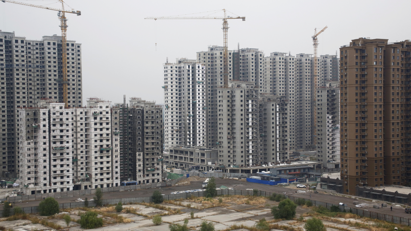Imbalances in real estate market to be addressed
A recent Ministry of Construction gathering attempted to identify and resolve the key issues surrounding Vietnam’s real estate market at this point in time.

At a recent meeting convened by the Ministry of Construction(MoC) and attended by key ministries, local authorities, industryassociations, and real estate developers, Deputy Prime MinisterTran Hong Ha raised concerns over mounting structural issueswithin Vietnam’s real estate market during the opening months of 2025. He pointed to a persistent supply-demand imbalanceand a skewed product structure that continues to plague themarket. Many developers, he noted, are facing resourceconstraints and lack the capital to move projects forward.Meanwhile, property prices in Vietnam remain among thehighest globally in terms of growth, making homeownershipincreasingly unattainable for average citizens.
Delayed projects and capital crunch
Despite repeated government directives to the MoC to addresscore bottlenecks and propose actionable solutions, little progresshas been made.
Deputy Minister of Construction Nguyen Van Sinh echoed theDeputy Prime Minister’s concerns, noting that the marketremains distorted with a limited supply of affordable housingand escalating prices. Many projects are entangled in legal redtape and prolonged approval processes, while developers aregrappling with funding shortages.
Mr. Le Hoang Chau, Chairman of the Ho Chi Minh City RealEstate Association (HoREA), said he has observed a mildrecovery in market sentiment but stressed that home pricesremain prohibitively high, with no clear signs of any downwards movement. He predicted that new supply in the mid-end housingsegment may not emerge until 2026-2027.
Industry leaders attributed the price escalation to a range offactors: chronic undersupply (particularly in the mid-markethousing segment), soaring construction material costs, slow landvaluation processes that delay project timelines, and sudden,unregulated land price hikes at the point of land allocation.
Authorities in both Hanoi and Ho Chi Minh City identified major administrative hurdles that continue to slow downdevelopment. These include convoluted investment approvalprocesses, inefficient licensing procedures, and inconsistenciesbetween detailed planning (1/500 and 1/2000 scale) and masterplanning.
Another pressing issue is the lack of a centralized system tomonitor and forecast real estate supply and demand. Whiledemand for social housing is widely acknowledged to be high,many localities have yet to assess actual needs or deploysufficient responses. Some social housing initiatives remainstalled due to a lack of clear market signals and policycoordination.
Strengthening transparency
Deputy Chairman of the Ho Chi Minh City People’s CommitteeBui Xuan Cuong proposed that the government considereliminating the requirement for investment policy approval for certain categories of projects or limiting the scope of itsapplication. He also suggested piloting the removal ofconstruction permits for reputable developers whose projectsmeet all design documentation standards, including safety, fireprevention, and landscape regulations, with a post-inspectionmechanism to be put in place. He further recommendedclassifying construction types to apply appropriate post-inspection management.
Minister of Construction Tran Hong Minh emphasized the needfor greater transparency throughout the real estate developmentprocess, to create a healthier market. This includes clarity inplanning, land prices, construction costs, taxation, and salesprices.
From the business community, representatives from majorcorporations called for consistent legal application acrossprovinces, highlighting the need to avoid legal grey areas orconflicts, especially in the transition between new and old laws.They also urged central authorities to address overlappingregulations in land, investment, and planning laws that hinderefforts to expand or adjust infrastructure plans. Additionally,they advocated for a more transparent and accessible legalframework that encourages and protects officials who takeinitiative in serving the public interest.
After hearing the feedback, Deputy Prime Minister Haacknowledged that while the real estate market has shown signsof recovery following the Covid-19 pandemic, its growthremains sluggish compared to pre-pandemic levels, impactingthe broader investment and business ecosystem connected to realestate.
Regarding increasing prices, he attributed the issue not only torising land and construction material costs but also toinefficiencies in administrative management. He pointed outpersistent bottlenecks in procedures such as investmentapproval, technical design, planning, and land valuation.
To address these challenges, the Deputy Prime Minister assignedspecific responsibilities to relevant ministries. The MoC, the Ministry of Finance, and the Ministry of Agriculture andEnvironment are tasked with reviewing the entire housingdevelopment process, particularly for social housing, coveringplanning, investment approval, land valuation, design,construction permits, and credit allocation. He also emphasized the need for clearly defined accountability, to preventbureaucratic delays or any avoidance of responsibility.
He raised the need to study taxation on idle land and delayedprojects, emphasizing that any new tax policy must be carefullycrafted to avoid penalizing legitimate land users. Cleardistinctions must be made between speculators and genuineusers, as well as between legal developers and those wastingresources.
The Deputy Prime Minister also directed the State Bank ofVietnam, the MoC, and the Ministry of Public Security to assessbad debts related to real estate and propose solutions tosafeguard the banking system. For real estate enterprises nolonger capable of recovery, authorities must consider handlingcollateralized assets through sale or transfer to capable investorsor even converting them into social housing.
Lastly, he urged relevant agencies to revise criteria andeligibility for social housing benefits. Instead of limiting optionsto accessing rent-to-own models, qualified citizens should beallowed to purchase units outright. Deputy Prime Minister Ha also called for improved access to preferential credit for bothdevelopers and homebuyers.







